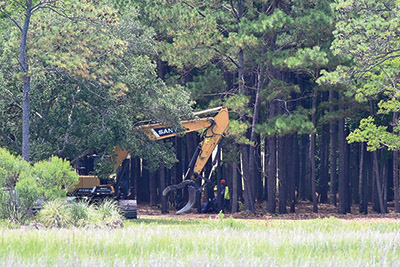Land use
Foes of rezoning see ‘chilling effect’ in counterclaims

Neighbors who oppose the rezoning of property on Pawleys Creek for a residential development have asked the Circuit Court to dismiss claims by the developer that they conspired with a citizens group to block the project.
The claims by Magic Oaks LLC and RCB Land Holdings LLC “are clearly intended to intimidate and have a chilling effect on the exercise of constitutional rights,” according to a filing this week by the neighbors – Micky Stikis, Elizabeth Martin, Don and Kathy Reid and Tall House Farm Partnership. “These tactics should not be tolerated as they are contrary to both law and public policy.”
Georgetown County rezoned 8.3 acres between Highway 17 and the creek as a “flexible design district” to allow the development of 27 lots. The property had been a mix of “general residential” and “general commercial” zoning, which allows residential development, but were shown on the county’s future land use maps as “conservation preservation.” That designation does not envision development, and the suit filed by the neighbors in June argues the county should have changed the zoning to comply with the maps.
The county and David Tanner, who sold the property to Magic Oaks, were also named in the suit.
Magic Oaks and RCB Land Holdings, whose principal is Tripp Neely, filed counterclaims saying that the citizens group Keep It Green is behind the challenge.
The property owners are represented by Cindy Person, chief counsel for Keep It Green Advocacy, and Patrick Hubbard, a law professor at the University of South Carolina. They also represent the plaintiffs, including Keep It Green, in four other suits challenging county land use decisions.
Three of those suits were dismissed by Circuit Court judges and are on appeal.
The counterclaim notes that “the gist of all these lawsuits” is the claim that the county’s zoning ordinance doesn’t comply with the future land use plan.
It seeks actual and punitive damages for “default on security obligations, interest, delay, changing market conditions, lost profits” and other things yet to be determined, according to the court filing.
Any damages, the neighbors say in the latest filing, “falls squarely on the Developer Defendants who cannot now shift the responsibility for their poor business decision by attempting to convert Plaintiffs’ legal challenge into a tort.”
The neighbors all opposed the zoning change as it was reviewed by the Planning Commission and County Council. They filed suit within the 60 days specified by state law.
The developers closed on the property sale, secured a mortgage and started development before the deadline for a legal challenge passed, the neighbors note in their filing.
They also point out that the counterclaim offers no evidence that the opponents interfered with any pending sales contracts and that the claim of a nuisance “does not even remotely begin to fit the legal requirements.”
As for a conspiracy with Keep It Green, which is not a plaintiff, the counterclaims “consist entirely of immaterial allegations, legal conclusions, and bald assertions without facts to support the elements of civil conspiracy,” according to the opponents’ filing.
The developers also asked the court to require that the opponents post a bond to cover their financial losses due to the delay caused by the lawsuit. There is no provision in state law for such a bond “in conjunction with challenging municipal zoning ordinances,” the opponents state.
“Developer Defendants’ alleged financial predicament is the direct result of their voluntary decision to close on the land, secure debt with the land, and enter into third party loan contracts before the expiration of the statutory 60 day period,” according to their filing.
The plaintiffs also face a counterclaim from Tanner, who says in filings that he was needlessly named as a defendant because the property was already sold when the suit was filed.
“The ulterior purpose is to cause unnecessary and inappropriate expense, time and difficulty for Defendant Tanner by refusing to remove him from the lawsuit in which no allegations are made against him for property he no longer owns,” according to a filing this month.
He seeks costs and damages for “abuse of process.”
Tanner also claims that the lawsuit is interfering with his contractual relations with Magic Oaks and RCB Land Holdings.
As part of the $3.875 million sale of the property, which also includes 10.7 acres of marsh, Tanner was to get a marshfront lot and have the developers build a house on it, according to the filing.
“Plaintiffs’ actions are without justification and have caused damage to Defendant Tanner in the form of unwarranted and baseless delay in the completion of his home.
He seeks costs and damages for “tortuous interference” in his contract.
Last week, a Circuit Court judge dismissed a claim in the neighbors’ suit that the County Council had improperly approved a change to the Magic Oaks plan to create a public kayak launch on the north side of the property.
They said that change should have be reviewed by the Planning Commission first.
The defendants, including the county, moved to have that struck from the suit because the kayak ramp location was contingent on getting public access from the adjoining Hammock Shops.
The owners of the shopping complex declined to provide access.
The neighbors said that didn’t change the fact that the county action was improper.
A judge disagreed.




